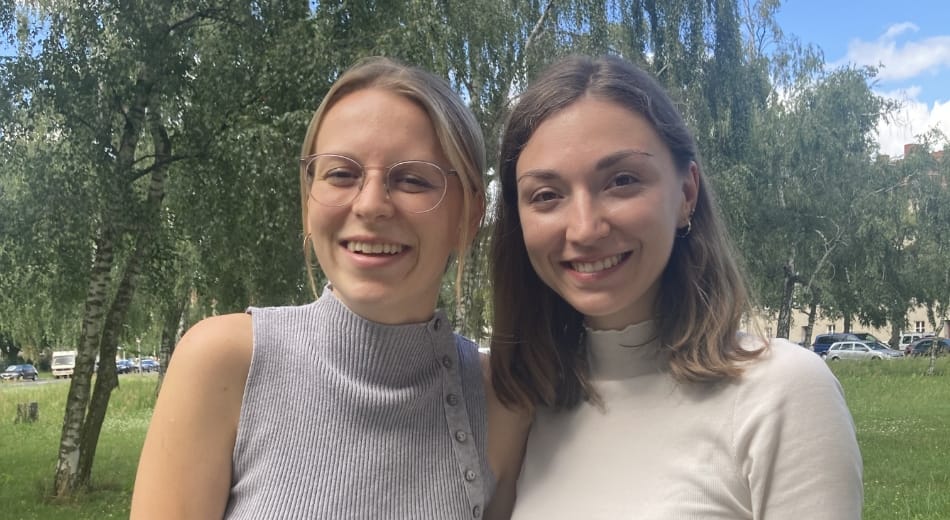- 22.11.2022,
- News & Insights
104 questions for RB research

Two doctors develop a survey on the burden of therapy and the organization of treatment.
“At first, I thought about the child, the parents and siblings,” says Leonie Mahrenholtz.
The children are extremely young.
Only the second thought was of therapy.
And her fellow student Maresa Klingerter adds: “I had to think about how big a break this is for the families.”
After all, it is a serious diagnosis that could result in the loss of an eye or sight.
That touched her deeply.
Term paper on retinoblastoma
KAKS in conversation with Leonie Mahrenholtz and MaresaKlingert.
Both women are 25 years old and are in their seventh semester of medical studies at Charité – Universitätsmedizin Berlin.
Leonie previously trained as an optician, Maresa is a state-certified nurse.
As part of their first state examination, they applied to the pediatrician Madlen Reschke for the topic of their term paper.
Through intensive discussions with Reschke, a doctor at the renowned Charité hospital, the two not only heard about the rare disease retinoblastoma for the first time, they also consciously chose the topic of retinoblastoma.
Cancer in the child’s eye – they knew little about it.
They found and curated information about the disease, its visibility, diagnosis, prompt treatment and chances of recovery in the relevant literature.
At least as important – the many conversations with Reschke and the specialists at the Clinic for Pediatric Ophthalmology at the Charité.
Therapy more stressful for parents than for children
Their aim was to create a questionnaire that documents the burden of therapy on children and parents, as well as the need for improvement in the organization and ideas for optimization.
The students developed 104 questions, eight open, the others multiple choice.
Their addressees: Parents of sick children.
Half an hour is all it takes to complete the questionnaire.
“31 parents took part,” says Leonie Mahrenholtz.
This was below their target of 40.
Of the 59 families whose children are currently undergoing treatment or aftercare at Charité, they reached 46.
Nevertheless, they consider the final number of participants to be positive.
“Many parents took the time to answer our questions, and there were detailed answers, especially in the open section.”
Two thirds of the study participants were mothers, one third fathers.
Separation from the child is a critical moment
The parents surveyed rated the stress for their child as “partly stressful” or “relatively stressful”.
The parents themselves rated the therapy as rather to very stressful during the acute phase.
Maresa Klingert commented: “At first, it was not clear what the high level of stress was”, as there were hardly any side effects apart from nausea in the children and the time spent in hospital was rather short.
However, a quarter of the young patients have to undergo enucleation of the eye and two thirds have to undergo intra-arterial and systemic chemotherapy.
Leonie Mahrenholtz: “The feeling that parents leave the clinic with is that they find the phase much more stressful than their children.”
Looking behind the scenes, however, makes it tangible.
Leonie Mahrenholtz adds: “The intensive phase and initial aftercare are particularly stressful for the parents.”
This includes waiting times at the clinic of six to eight hours.
And the child’s anesthesia, which is essential for the examinations; in other words, the moment when the parents have to leave their child.
“The separation from the child is one of the most critical moments for the parents,” says Maresa.
Parents take sick leave
In addition to the emotional pressure, there is also social pressure.
For mothers and fathers, the first phase of aftercare means organizing their family and job.
Maresa Klingert: “Around 50 percent of parents take sick leave. Out of concern about being made redundant.”
The greater existential concern of whether their child will die or go blind has not even been dealt with psychologically at this stage.
Various hardships come together in this phase of therapy.
Because, according to the two doctors, there is also the worry of a relapse.
This also becomes clear in the survey.
And despite the greatest fears and maximum stress, the parents also report good moments during the intensive phase and the time afterwards.
“Most of them were positive,” says Leonie, “especially in the open part of the survey: The family had grown closer together, everything was good in the end, there was something positive in the terrible.”
Tackling the structural problems
So what is the bottom line, the finding of your survey?
For Maresa Klingert, one thing is clear: “There are problems with structural processes. Reducing waiting times is something that can be tackled.”
However, the trainee doctor also knows that this is the biggest challenge in the day-to-day running of a commercial system such as a clinic.
Despite scheduling, something can always come up.
And something always comes up: The unforeseen, emergencies and staff shortages.
In the survey, parents complained about a shortage of nursing staff; nurses in particular are important contacts for them.
However, the shortage of skilled staff in Germany can also be felt in hospitals.
And the nurses who are there often have little time.
A problem that needs to be solved politically.
But better relaxation rooms, a child-friendly environment, stuffed animals that children could play with during anesthesia and separation from their parents, an expanded psychological offer for families: all of this should be possible.
This is what the medical students assume.
Their hope is that the data they collect will “change something”.
According to Maresa, concrete concepts need to be developed from this.
And Leonie adds: “It’s all known, but if it’s written down…”
(Note from KAKS: At the time of the interview with KAKS, the grading of the term paper on retinoblastoma was still pending. We wish Leonie Mahrenholtzand Maresa Klingert a successful first state examination and all the best for the future).